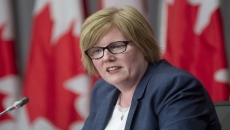OTTAWA - As Canada plans to significantly ramp up its immigration levels in the coming years, some policy experts are worried about potential effects on health care, housing and the labour market.
But Immigration Minister Sean Fraser insists that Canada needs more newcomers to address labour shortages and demographic changes that threaten the country's future.
"If we don't continue to increase our immigration ambition and bring more working-age population and young families into this country, our questions will not be about labour shortages, generations from now," Fraser said in an interview with The Canadian Press.
"They're going to be about whether we can afford schools and hospitals."
In November, the federal Liberal government announced a new immigration plan that would see Canada welcome 500,000 immigrants per year by 2025.
A record-breaking 431,645 people became permanent residents in 2022.
The new immigration rates will be substantially higher than rates in similar countries, such as Australia, said University of New Brunswick political science professor Ted McDonald.
That's not a bad thing in itself, he said. But in his view, raising immigration levels isn't the right way to address current labour shortages.
"I think the policy would make more sense if it's aligned with what are seen as underlying structural labour market shortages that are going to persist," McDonald said.
At the same time, he said one justification for immigration is clear: Canada has a declining birthrate.
According to Statistics Canada, the country’s birthrate fell to a record low of an average of 1.4 children per woman in 2020. That's well below the 2.1 rate needed to maintain a population without immigration.
That doesn't stop others from worrying about how more newcomers could put a strain on other perennial issues such as housing affordability and health care.
"There's no assessment that I have seen of the impact of these targets on housing affordability and availability, no assessment of these targets in terms of additional pressures on health care," said Andrew Griffith, a former high-ranking official at Immigration and Citizenship Canada.
But Fraser said that many of the new permanent residents already live in Canada. For example, 157,000 international students became permanent residents in 2021.
"It's not as though there are half a million people coming to Canada who are not already here," the minister said.
He said changes are also coming to the Express Entry system in the spring so that immigrants can be selected based on the sector and region in Canada they're heading to.
That will help alleviate some of the strain on things like health care and housing, he said.
The ongoing debate on whether the new targets are too ambitious is also coinciding with heightened scrutiny regarding what — or who — is influencing government policy.
Radio-Canada reported last week that two sources within Immigration, Refugees and Citizenship Canada said McKinsey & Company's influence on immigration policy has grown in recent years.
A government response to a Conservative MP's written question, which was tabled in the House of Commons in December, says the department has not recently awarded any contracts to the consulting firm — at least, not during the timeframe the MP asked about, which was from March 2021 until October 2022.
And during the interview Thursday, Fraser said McKinsey has had no role to play in the new immigration levels plan.
"I'm not being influenced by them," Fraser said.
"This is something that I've arrived at independently."
The minister said he came to the decision regarding the immigration plan on the advice of department officials. He said he also took into consideration what he's heard from different organizations, stakeholders, and provincial and territorial leaders.
Policy experts often worry about the outsized influence stakeholders can have on government policies, since interest groups lobby the government to implement policies that are in line with their priorities, and some are more powerful than others.
Business groups in Canada have seen ongoing labour shortages as a major concern, and they have called on the government to help fill vacancies.
Following the announcement of the new plan, the Business Council of Canada applauded the targets in a press release, saying that "an economy that is chronically short of workers cannot achieve its potential."
Griffith said that in his opinion, the current government is "fairly responsive to the pressures of stakeholders," whether they are business groups or organizations that work with immigrants.
While the interests of stakeholders can sometimes align with what is actually good policy, McDonald said stakeholder groups have "vested interests."
"We have to be aware of where the advocacy is coming from, and not being naïve about it," he said.






